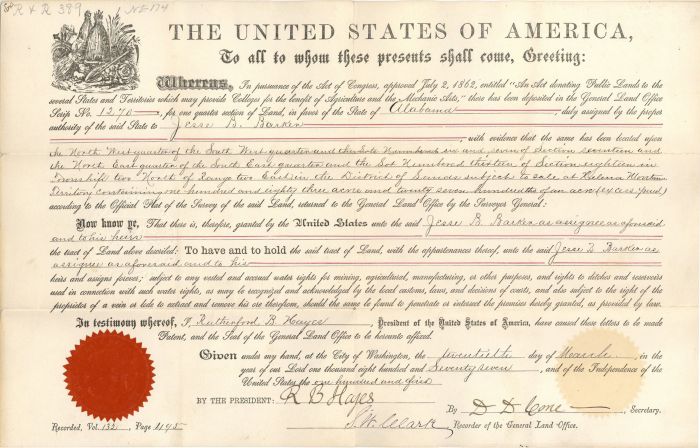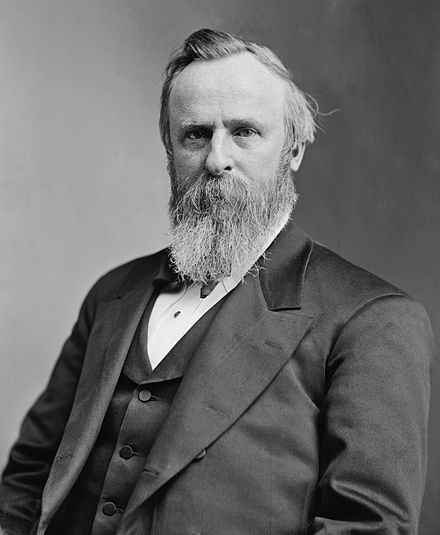Land Grant signed for R.B. Hayes by Secretary
Inv# AU1611
Land Grant signed for R.B. Hayes by secretary.

Rutherford Birchard Hayes (/ˈrʌðərfərd/; October 4, 1822 – January 17, 1893) was an American politician and attorney who served as the 19th president of the United States from 1877 to 1881, after serving in the U.S. House of Representatives and as governor of Ohio. Before the U.S. Civil War, Hayes was a lawyer and staunch abolitionist who defended refugee slaves in court proceedings. He served in the Union Army and the House of Representatives before assuming the presidency. His presidency represents a turning point in U.S. history, as historians consider it the formal end of Reconstruction. Hayes ended all federal efforts to bring racial equality to the South.
As an attorney in Ohio, Hayes served as city solicitor of Cincinnati from 1858 to 1861. At the start of the Civil War, he left a fledgling political career to join the Union Army as an officer. Hayes was wounded five times, most seriously at the Battle of South Mountain in 1862. He earned a reputation for bravery in combat and was promoted to brevet major general. After the war, he served in Congress from 1865 to 1867 as a Republican. Hayes left Congress to run for governor of Ohio and was elected to two consecutive terms, from 1868 to 1872. He served half of a third two-year term from 1876 to 1877 before his swearing-in as president.
In 1877, the Electoral College made Hayes president after the 1876 United States presidential election, one of the most contentious in U.S. history. He lost the popular vote to Democrat Samuel J. Tilden, but narrowly won an intensely disputed electoral-college vote after a Congressional commission awarded him 20 contested electoral votes in the Compromise of 1877. The election was resolved with a backroom deal whereby the Democrats acquiesced to Hayes's election on the single condition that he withdraw direct federal support for Reconstruction in the former Confederate states.
Hayes believed in meritocratic government and in equal treatment without regard to wealth, social standing or race. He used the military to resolve the Great Railroad Strike of 1877, which remains the deadliest confrontation between striking workers and strikebreakers in US history. As president, Hayes implemented modest civil-service reforms that laid the groundwork for further reform in the 1880s and 1890s. He vetoed the Bland–Allison Act of 1878, which put silver money into circulation and raised nominal prices; Hayes saw maintenance of the gold standard as essential to economic recovery. His policy toward western Indiansanticipated the assimilationist program of the Dawes Act of 1887.
Hayes kept his pledge not to run for reelection, retired to his home in Ohio, and became an advocate of social and educational reform. Biographer Ari Hoogenboom has written that Hayes's greatest achievement was to restore popular faith in the presidency and to reverse the deterioration of executive power that had established itself after Abraham Lincoln's assassination in 1865. Supporters have praised his commitment to civil-service reform. His critics deride his leniency toward the former Confederate states and his withdrawal of federal support for African Americans' voting and civil rights. Historians and scholars generally rank Hayes as an average to slightly below-average president.










Ebay ID: labarre_galleries